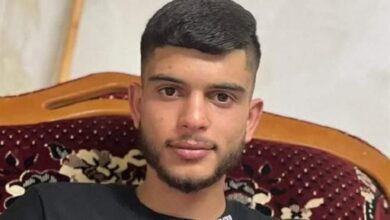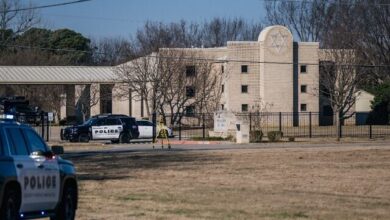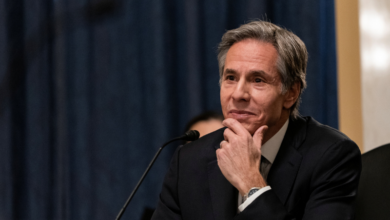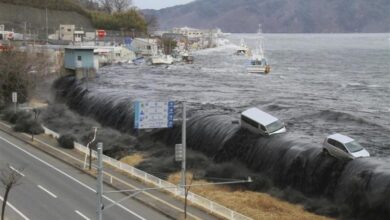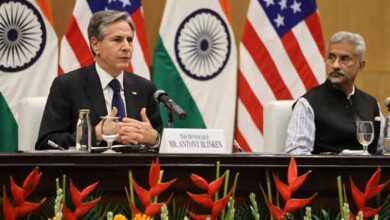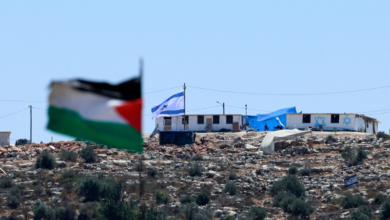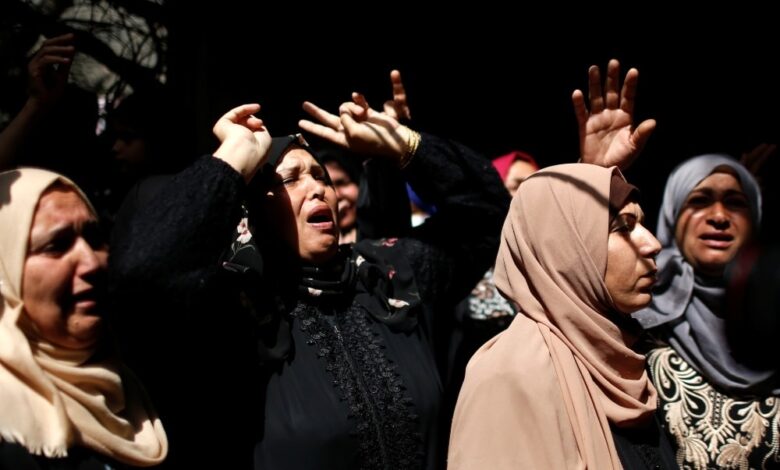
Israel and Hamas exchanged heavy fire on Tuesday, with at least 25 Palestinians killed in Gaza, in a dramatic escalation between the bitter rivals sparked by violence at Jerusalem’s flashpoint Al Aqsa Mosque compound.
Nine children were among those killed in the blockaded Gaza Strip that is controlled by Hamas and 125 people there were wounded, local health authorities said.
More than 300 rockets have been fired by Palestinian militants towards Israel since Monday, with over 90 per cent intercepted by its Iron Dome missile defence system, army spokesman Jonathan Conricus said. At least six Israelis have been injured.
Israel has responded with 130 strikes carried out by fighter jets and attack helicopters on military targets in the enclave, killing 15 commanders from Hamas, said Conricus, while the group Islamic Jihad confirmed two of its senior figures were killed.
More rockets were launched from the coastal enclave on Tuesday, as Hamas’ Qassam Brigades armed wing vowed it would turn the southern Israeli community of Ashkelon into “a hell”.
Conricus said Israel had no confirmation its strikes had impacted Gaza civilians, or whether the casualties there were caused by Palestinian rockets misfiring.
Tensions in Jerusalem have flared into the city’s worst conflicts since 2017 since Israeli riot police attacked large crowds of Palestinian worshippers on the last Friday of Ramazan.
Nightly unrest since then at the Al Aqsa compound in annexed east Jerusalem has left more than 700 Palestinians wounded, drawing international calls for de-escalation and sharp rebukes from across the Muslim world.
Diplomatic sources told AFP that Egypt and Qatar, who have mediated past Israeli-Hamas conflicts, were attempting to calm tensions.
US Secretary of State Antony Blinken strongly condemned the rocket attacks by Hamas, saying they “need to stop immediately”.
“All sides need to de-escalate, reduce tensions, take practical steps to calm things down,” he said.
‘You escalate, we escalate’
Hamas on Monday warned Israel to withdraw all its forces from the mosque compound and the east Jerusalem district of Sheikh Jarrah, where looming evictions of Palestinian families have fuelled angry protests.
Sirens wailed across Jerusalem just after the 1500 GMT deadline set by Hamas as people in the city, including lawmakers in the Knesset legislature, fled to bunkers for the first time since the 2014 Gaza conflict.
Prime Minister Benjamin Netanyahu said Hamas had “crossed a red line” by targeting Jerusalem.
The Qassam Brigades said the rocket attacks were in response to Israeli actions in Sheikh Jarrah and around the Al Aqsa mosque.
“This is a message that the enemy must understand well: If you respond we will respond, and if you escalate we will escalate,” it said.
Several properties in Israel have been damaged by rockets, including an apartment in the southern city of Ashkelon, and a house in Beit Nekofa, about 10 kilometres west of central Jerusalem.
An Israeli Arab died from gunshot wounds in violence with Israeli Jews in the central city of Lod, police said on Monday, without providing details.
Rocks and rubber bullets
Fears of further chaos in the Old City had temporarily eased on Monday when Israeli organisers of a march to celebrate the Jewish state’s 1967 capture of east Jerusalem cancelled the event.
But then came the Hamas warning, followed by the rockets, which also forced the evacuation of the Western Wall and other sites.
On Monday evening, as during the previous nights since Friday, Israeli officers in riot gear fired rubber bullets, stun grenades and tear gas at Palestinians who hurled rocks in return.
There were signs of calm in Jerusalem’s Old City on Tuesday, an AFP reporter said, but the risk of escalation remained high.
The Palestinian Red Crescent said at least 520 Palestinians have been wounded since Monday, including more than 200 who were hospitalised, five of them in critical condition.
The Israeli police reported 32 injuries in their ranks.
Palestinian man Siraj, 24, sat in a wheelchair with his two legs bandaged at east Jerusalem’s crowded Makassed Hospital after suffering a spleen injury from being hit by a rubber bullet.
“They shot everyone, young and old people,” he said.
Makassed director Adnan Farhoud said most of Monday’s injuries were to the head, chest and limbs, adding that when “you mean to harm someone, you shoot at the head”.
UN ‘deeply concerned’ by violence
The United Nations rights office said on Tuesday it was “deeply concerned” by the escalation of violence in the occupied Palestinian territories, east Jerusalem and Israel.
The Office of the UN High Commissioner for Human Rights appealed for calm after several days of unrest.
“We are deeply concerned at the escalation of violence in the occupied Palestinian territory, including east Jerusalem, and Israel in the past days,” Rupert Colville, spokesman for UN rights chief Michelle Bachelet’s office, told reporters in Geneva.
“We condemn all violence and all incitement to violence and ethnic division and provocations.”
He urged Israeli security forces to allow “the right to freedoms of expression, association and assembly”.
“No force should be used against those exercising their rights peacefully.”
“The use of indiscriminate weapons, such as the rockets being fired into Israel, is strictly prohibited under international humanitarian law and must stop immediately,” said Colville.
He stressed that “Israel must respect international humanitarian law,” adding that any attacks should be directed at military objectives, with precautions taken to avoid civilian deaths.
Meanwhile, the UN special rapporteurs on human rights in the Palestinian territories and on adequate housing, Michael Lynk and Balakrishnan Rajagopal, condemned the Israeli security forces’ response to the protests.
“The immediate source of the current tensions in east Jerusalem are the actions of Israeli settler organisations, whose stated aim is to turn Palestinian neighbourhoods into Jewish neighbourhoods,” they said.
“Neither short-term calm nor long-term peace will be accomplished as long as the national and individual rights of the city’s Palestinian population are routinely abrogated.”
Special rapporteurs do not speak for the UN but report their findings to it.
Erdogan vows to mobilise world to stop Israeli ‘terror’
On Monday, Turkish President Recep Tayyip Erdogan vowed to mobilise the world to stop Israeli “terror”, in phone calls placed to Palestinian leaders during a surge in violence in Jerusalem.
Erdogan placed separate calls to Palestinian president Mahmud Abbas and Hamas leader Ismail Haniyeh to denounce Israel’s actions and extend support.
The Turkish leader pledged “he will do everything in his power to mobilise the world, starting with the Islamic world, to stop Israel’s terror and occupation,” his office said.
Meanwhile, Foreign Minister Shah Mahmood Qureshi spoke with his Turkish counterpart “on the increasingly dire and oppressive situation in Palestine”.
“Fully support Turkey’s call to convene meeting of OIC and UN. Storming first Qibla of Islam, Masjid Al Aqsa, killing children and forcing evictions — absolutely unacceptable,” he said.
Erdogan, who has long cast himself as the champion of the Palestinian cause, had on Saturday branded Israel a “cruel terrorist state”.
Relations between Israel and Turkey have been strained since a Turkish NGO oversaw a flotilla of ships that tried to break Israel’s blockade of the Gaza Strip in 2010.
Hundreds of people demonstrated in support of Palestinians on Sunday evening outside Israel’s consulate in Istanbul. The Turkish police did not intervene despite a ban on large public gatherings during the coronavirus pandemic.
Erdogan’s sharp criticism contrasts with months of speculation that Turkey and Israel were looking for ways to normalise ties and re-appoint ambassadors to each other’s capitals.
Turkey is seeking to mend fences with its rivals in the Middle East, including Egypt and Saudi Arabia — a drive that gained momentum after Joe Biden became US president.
In December, Erdogan drew a red line, saying closer relations with Israel were impossible if the Jewish state pursued its current policies in the Palestinian territories. “That’s the point at which we disagree with Israel,” Erdogan said at the time.

